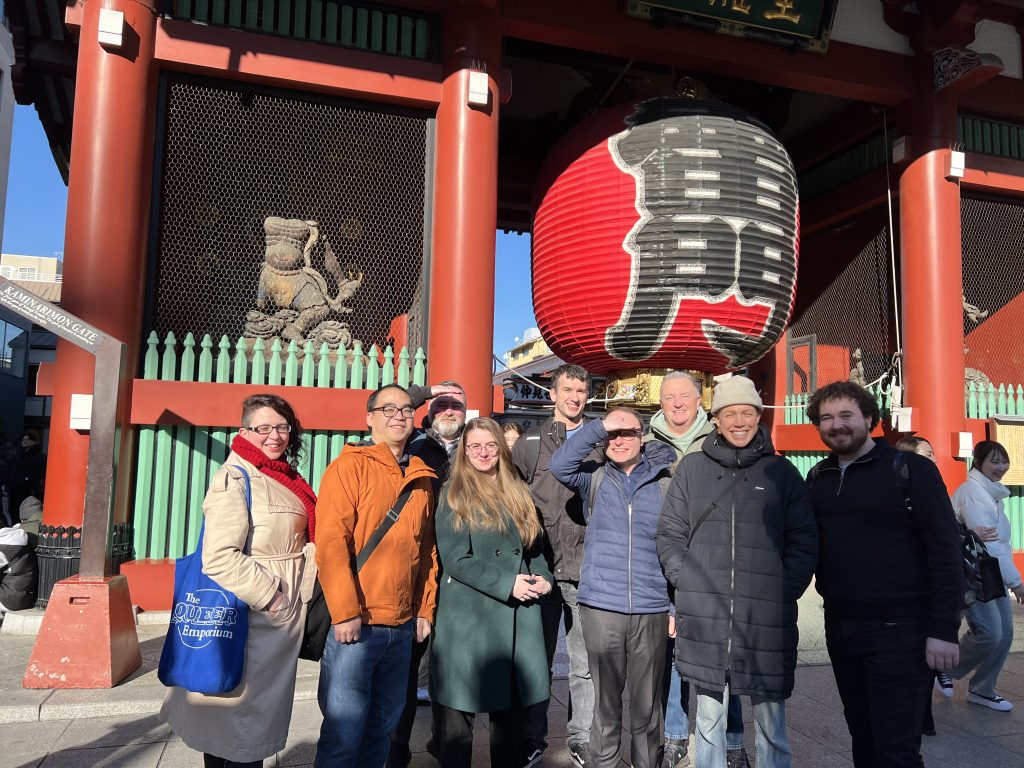
JST 2025 group at Sensoji Temple in Tokyo
The Overseas Local Government Executive Exchange and Cooperation Seminar 2024 provided a unique opportunity for UK public sector professionals, this year with links to Wales to explore Japan’s approach to governance, economic development, and sustainability. Held in Tokyo and Oita Prefecture, the seminar focused on sustainable urban development for future generations, fostering meaningful exchanges between UK and Japanese officials, academics, and business leaders.
One of the most insightful sessions took place with Professor Shunsuke Kimura introducing participants to the structure and powers of Japanese local government. The discussion touched on Japan’s approach to tourism policies, particularly efforts to combat overtourism and the implementation of tourism taxes. These insights were particularly relevant for UK delegates, some of whom are grappling with similar challenges in balancing economic benefits with the preservation of local environments.
The delegation’s visit to Oita Prefecture offered a deeper understanding of Japan’s regional development policies. Officials introduced strategies for managing local tourism and fostering international partnerships, reflecting a long-term investment approach that differs significantly from economic cycles in Wales. A visit to Beppu’s thriving bamboo craft industry illustrated how traditional crafts can be preserved while also supporting economic diversification and sustainability. Similarly, the Ajimu Green Tourism Study Group provided an inspiring example of rural development, showcasing Japan’s pioneering work in farm-stay tourism, which has been successfully integrated into the local economy since 1996.
Beyond economic strategies, the seminar also shed light on Japan’s approach to social welfare and inclusive employment. At the House of the Sun and Mitsubishi Shoji Sun Co., participants witnessed innovative models that support people with disabilities, ensuring they have meaningful work opportunities. This visit underscored the potential for integrating similar initiatives into UK policy, reinforcing the value of social enterprises in creating a more inclusive workforce.
Education and cultural exchange were also key themes of the visit. At Ritsumeikan Asia Pacific University (APU), UK professionals engaged with international students, learning how Japan fosters a globally competitive workforce. Discussions with officials from the Oita Prefectural Art Museum highlighted the role of cultural diplomacy in strengthening ties between Japan and Wales, particularly through collaborative projects with the National Museum of Wales.
Reflecting on their experiences, the UK participants noted how Japanese urban planning prioritises long-term development over short-term financial gains. This strategic approach could offer valuable lessons for devolved and local authorities in the UK as they navigate their own challenges in sustainable urban growth, economic development, and inclusive policymaking. The seminar not only deepened the participants’ understanding of Japanese governance but also laid the foundation for future collaboration between the two countries.
Joshua Vuglar, Head of Modern Slavery and Workers’ Rights in the Welsh Government said:
“It was excellent to connect with colleagues in Japanese local government. The professionalism and commitment to outstanding public service at all levels of public administration is a credit to Japan. I was impressed by how Japanese governance operates on the principle of subsidiarity. The highly consistent Japanese model of devolution, which has as its foundation an effective and empowered system of municipal governance, is central to Japan’s social and economic success.
Visiting Oita Prefecture was particularly important. The Welsh Government has a Memorandum of Understanding with the Oita Prefectural Government, which sets out five key areas for collaboration: Arts & Culture; Sport; Academia; Tourism; Food & Drink. Exploring these areas with colleagues in Oita Prefecture, including through visits such as meeting students and staff at Ritsumeikan Asia Pacific University, was an invaluable opportunity. I intend to continue to support our cultural, social and economic links, building on the impact of the Study Tour.”
Ronan West, Corporate Services Officer in the Healthcare Inspectorate Wales of the Welsh Government also commented:
“Experiencing rural Japan was a highlight, with a visit to the Ajimu Green Tourism Study Group and a delightful lunch at a farm stay, where the food was exceptional. The trip concluded with a visit to the Usa Jingu Shrine, rounding off a comprehensive and enriching experience.
The tour provided me with exposure to innovative local governance practices in Japan (particularly in sustainability, tourism and social welfare), opportunities to network and establish exchange partnerships between Welsh government and counterparts in Japan, and a platform to discuss shared challenges around environmental, economic and social well-being, framed by Wales’ commitment to the well-being of future generations.”
JST 2026 tour application and schedule details will shortly be made public; please email mailbox@jlgc.org.uk with ‘JST 2026’ in the subject bar with your name, job title and employer for the details when they become available.

